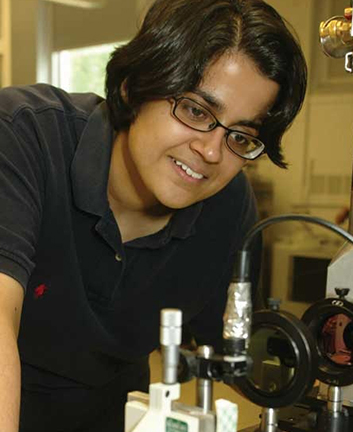
Fatima Toor
In this installment of Senior Member Insights, OPN talks with Fatima Toor. Fatima is a co-founder and vice president of a semiconductor optoelectronics startup company, Firefly Photonics LLC., and an assistant professor at University of Iowa, USA. She is also an affiliate member of the Iowa Center for Research, Exploration, and Advanced Technology in Engineering and Sciences (Iowa CREATES), and Materials Analysis, Testing, and Fabrication (MATFab) Facility, Center for Computer Aided Design and Holden Comprehensive Cancer Center - Experimental Therapeutics program.
Her lab’s goal is to conduct fundamental experimental research to study and design innovation in photonics relevant to the fields of energy, health, environment and security. The lab’s research activities encompass the field of photonics at the interface of optical engineering, materials engineering, quantum physics and electromagnetics. To date, Fatima’s research group has received more than twenty federal, state and seed grants to develop high performance sensors, solar cells and light-emitting diodes (LEDs) and to investigate the fundamental science of non-silicon III-V nanowire structures for light-emitting applications.
What first interested you in pursuing science?
I think science was in my blood! My dad is a chemical engineer and my mom was a college-level mathematics professor. I grew up being inspired by my dad to apply science principles to the world around us. I was always a good student of math and science; it just came naturally to me.
What aspect of your current work do you find the most interesting or exciting?
I really enjoy the intellectual freedom that being an academic brings. I can basically work on anything interesting as long as I can get funding for it. I enjoy competing for research grants on the exciting new science and technologies that my team is developing.
Has there been a particularly difficult decision in your career thus far? If so, what did you do to make the right decision for you?
Actually, becoming a university professor was a difficult decision for me. I was planning to continue being in industry after my postdoctoral work. However, due to family reasons, I moved to a university town and got hired through a competitive search in my department. Given the amount of fun I have at this job now, I think I made the right decision, but it took a couple of years to recognize that. I also continue the industry aspect of my career interests by being a co-founder of a successful tech startup, Firefly Photonics LLC.
What professional resources do you rely on to stay active and engaged with your field?
I am very active in professional organizations, specifically OSA and SPIE, which has helped tremendously in growing my professional network. I also frequently attend professional conferences to learn about the current status of my research field and to meet with old and new colleagues.
What tips do you have for effective collaboration in your field?
Collaboration is key in this day and age. I have built a successful collaboration network through my own initiative and efforts to contact relevant researchers who I knew were productive themselves, and to set up meetings with them. As a junior person, I had to be willing to do the hard work, but it has paid off. It is important to recognize that, just as in personal friendships, it is important to surround yourself with other successful researchers professionally; that is the only way to be successful yourself. So pick your collaborators wisely.
What is one piece of advice that you wish you were given as a student/early in your career?
I wish I was told early in my career that it is okay to fail. I used to get discouraged easily, but with time I realized that failure is part of the process. It is important to try and try again. Most successful people do the same.
What have you learned by being a mentor to others, and what have you learned from mentors who helped shepherd your career?
I have learned that while being either a mentee or a mentor, it is important to respect the other person and help without expecting a favor in return. My favorite mentors were those with whom I felt respected, and I give this forward to my mentees. I clearly see the benefits of it, where my mentees’ self-confidence grows as they observe that I am treating them as an equal and challenging them as I would challenge a colleague. This self-confidence leads them to achieve amazing things that I am really proud of.
What are daily habits that help you to be successful?
I think being organized and delegating tasks as needed helps me be successful. It is important to work hard but also to work smart, and the latter involves organization and the ability to delegate effectively.
At this point in your career, what are you most looking forward to next?
At this point in my career, I have no plans of slowing down and I look forward to seeing what my career brings. I have a vision of where I want to be, and I am hopeful that I will get to that point, however challenging the path may be.
If you weren’t in the sciences, what would be your dream career?
I would have liked to be a commercial pilot, so that I can travel the world while also doing my job. I have the travel bug and love exploring new cultures, countries, people, etc.
